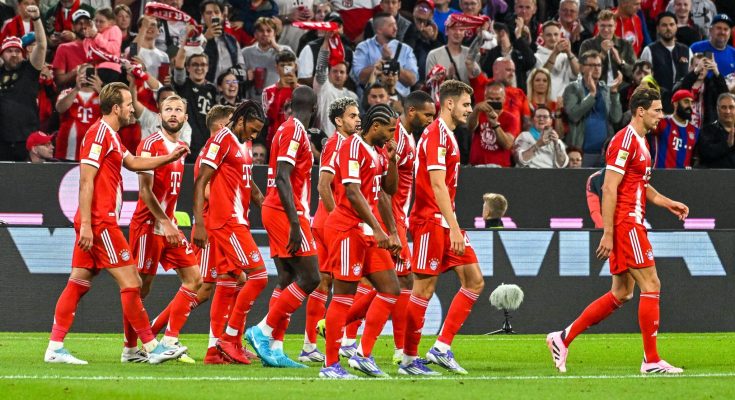The conversation about the strongest football team in Europe rarely ends without the mention of FC Bayern Munich, a club that has built its modern identity on dominance, consistency, and above all, an enviable squad depth that very few clubs in the world can match. The Bavarian giants have long been associated with success both domestically and internationally, but what sets them apart in recent years is the sheer quality they possess across every position, the tactical flexibility their depth provides, and the psychological advantage this strength gives them over opponents. In a continent where the competition is fiercer than ever, Bayern’s ability to rotate, adapt, and maintain intensity regardless of injuries, suspensions, or fixture congestion has made them the most feared team in Europe.
When one looks at the makeup of Bayern’s current squad, the first observation is not just the quality of their starting eleven but the fact that their bench could rival the first team of many top European clubs. The arrival of world-class players in recent years such as Harry Kane, Matthijs de Ligt, Leroy Sané, Kingsley Coman, Joshua Kimmich, Jamal Musiala, and Serge Gnabry highlights the balance between proven experience and explosive young talent. In addition, the club has kept a solid core of German internationals, which helps maintain the club’s identity while blending seamlessly with international stars. This combination creates a frightening prospect for opponents, as Bayern can field multiple lineups that are equally capable of dismantling any side they face.
One of Bayern’s greatest strengths lies in their attack, which arguably stands as the most complete offensive unit in Europe. Harry Kane’s arrival added a ruthless focal point that the club had been searching for since Robert Lewandowski’s departure. Kane is not only a goal machine but also a creative presence who can drop deep, link play, and free up wingers like Sané, Coman, and Gnabry to exploit space behind defenses. Add to that the brilliance of Jamal Musiala, who has quickly grown into one of the most dynamic young playmakers in world football, and you have an attack that can strike from all angles. What makes this attack terrifying is not only the first-choice names but also the replacements. Thomas Müller, a Bayern legend, still provides intelligence, pressing, and big-game moments. Mathys Tel, a teenage prodigy, is developing into a lethal option who can change games from the bench. Opponents facing Bayern know that even if they manage to contain Kane or Sané for sixty minutes, the introduction of fresh legs like Tel or Müller could undo all their defensive work.
Beyond their attacking prowess, Bayern’s midfield depth stands out as one of the most balanced in Europe. Joshua Kimmich remains the heartbeat of the team, dictating tempo, breaking lines with his passing, and providing defensive cover when necessary. Alongside him, players like Leon Goretzka and Konrad Laimer add dynamism, power, and versatility. Goretzka’s ability to surge forward and score crucial goals has often been a game-changer, while Laimer provides relentless energy and pressing quality. Furthermore, the club’s investment in young midfielders ensures continuity for the future, making Bayern’s central unit as sustainable as it is dominant. In a European landscape where midfield control often decides the biggest matches, Bayern’s ability to rotate between technical and physical profiles allows them to adapt seamlessly to different opponents. Against possession-heavy sides like Manchester City, they can deploy a more combative midfield. Against defensive teams, they can opt for creativity and ball circulation. Few clubs possess such flexibility.
Defensively, Bayern’s squad is equally frightening. The backline boasts leaders and ball-playing defenders capable of handling both high lines and deep defensive blocks. Matthijs de Ligt provides composure and strength, Dayot Upamecano brings pace and aggression, while Kim Min-jae adds aerial dominance and tactical discipline. On the flanks, Alphonso Davies remains one of the most explosive left-backs in world football, combining attacking flair with recovery speed that few attackers can outrun. On the opposite side, Noussair Mazraoui has grown into a dependable right-back, while versatile options like Raphaël Guerreiro give Bayern the tactical flexibility to switch between traditional full-back systems and inverted roles. The beauty of Bayern’s defensive depth is not just in the quality but the ability to rotate without a drop in standard. Injuries or suspensions rarely expose the squad because there is always another top-tier defender ready to step in. This reliability creates a psychological edge, as rivals know that even exploiting an injury crisis offers no guarantee of weakening Bayern.
The goalkeeper position also highlights Bayern’s unique squad depth. Manuel Neuer, though in the twilight of his career, remains a colossus between the posts and a leader who has defined a generation of goalkeeping. Behind him, the club has invested wisely in backups who can step in seamlessly when required. This ensures that even in one of the most crucial positions on the pitch, Bayern can rely on experience, composure, and quality. Goalkeepers often set the tone for a team’s confidence, and Bayern’s roster provides stability that underpins their entire defensive structure.
What makes Bayern’s squad depth even more impressive is not simply the names on paper but how effectively the coaching staff integrates them into a cohesive system. Unlike other European powerhouses that rely heavily on a fixed starting eleven, Bayern operate with a fluid squad that can rotate without losing identity. Their style of play—high pressing, quick transitions, and relentless attacking waves—demands intense physical effort. With a congested calendar that includes Bundesliga, DFB-Pokal, Champions League, and international breaks, fatigue and injuries are inevitable. Yet Bayern rarely suffer prolonged dips in performance because they have two or even three players per position who can execute the system at the same high level. This has been one of their biggest advantages in Europe, where knockout competitions often hinge on squad depth when the season reaches its climax.
Psychologically, Bayern’s squad strength intimidates opponents before a ball is even kicked. Teams know that even if they prepare extensively to counter Bayern’s first eleven, the substitutions in the second half can completely change the dynamic. This forces rivals to play with caution, often sitting deeper than they would prefer, which only invites more pressure from Bayern. The aura of inevitability around Bayern stems not just from their historic reputation but from the knowledge that there are no weaknesses to exploit. If an opponent focuses on shutting down the wings, Bayern can strike through the middle. If they crowd the box, Bayern can score from range or set-pieces. This multifaceted threat makes them a nightmare to plan against.
Financial stability and smart recruitment further underpin Bayern’s squad depth. Unlike some European giants that rely on risky spending sprees, Bayern have maintained a strategy of targeted signings combined with player development. They do not chase every transfer rumor but instead focus on securing players who fit their system and culture. The integration of academy prospects such as Musiala alongside big signings like Kane demonstrates this balance. The result is a squad that is not only deep but also harmonized, with each player understanding their role. This harmony reduces internal friction and ensures that even rotation players remain motivated and effective.
In the European context, Bayern’s depth stands out even more. Clubs like Real Madrid, Manchester City, and Paris Saint-Germain boast immense talent, but Bayern’s strength is in how evenly spread their quality is across the pitch. While some rivals rely heavily on a few superstar individuals, Bayern have the luxury of distributing responsibility among multiple match-winners. In the Champions League, this balance is crucial. Injuries to star players can derail other clubs’ campaigns, but Bayern’s machine keeps rolling regardless of setbacks. This is why their opponents fear them most in knockout football, where resilience and adaptability separate the contenders from the champions.
Bayern’s domestic dominance also feeds into their European fear factor. The Bundesliga often sees Bayern rotate heavily and still secure victories, allowing their stars to remain fresh for continental challenges. This pattern ensures that when the latter stages of the Champions League arrive, Bayern’s squad is not fatigued but instead finely tuned. The continuity of success in Germany has created a winning culture that permeates the squad. Every player, whether starting or coming from the bench, carries the expectation of victory. This mentality is infectious and creates an internal pressure that drives performances higher. In contrast, many European rivals face tougher domestic battles that drain their squads before continental campaigns reach critical stages.
The fear that Bayern inspire across Europe is therefore not rooted in any single factor but in the combination of depth, balance, mentality, and adaptability. They represent the complete package: a team that can outscore you, outwork you, outthink you, and outlast you. Every opponent stepping onto the pitch against Bayern knows they are facing not just eleven men but an entire squad of relentless quality. It is this depth that makes Bayern Munich not only successful but also feared, as they embody the rare combination of tradition, modern efficiency, and endless firepower.
Ultimately, the essence of Bayern’s dominance lies in their ability to make the extraordinary seem routine. Their squad depth allows them to brush aside injuries, outlast fixture congestion, and impose their will on the biggest stages. In a football world where unpredictability often rules, Bayern Munich’s deep squad strength creates a sense of inevitability that their rivals dread. This aura, backed by tangible quality across every position, is why Bayern Munich are considered the most feared team in Europe and why they remain perennial contenders for every trophy available. Their opponents are not just playing against eleven players; they are up against a footballing institution powered by a squad so deep that even Europe’s finest find themselves overwhelmed.



